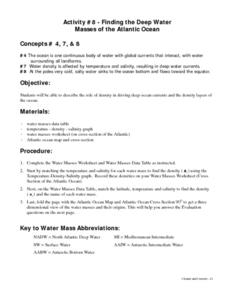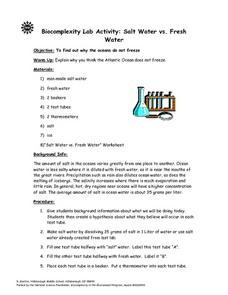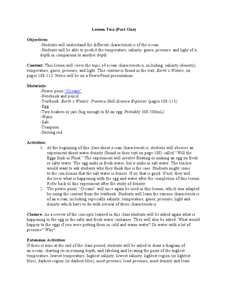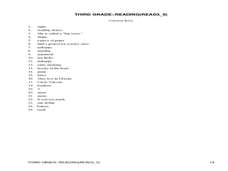Curated OER
Why Is The Sea Salty?
Students observe how salt concentration increases in water and how salt remains after water evaporates. In this salty sea lesson plan, student use rock salt, water, containers, and strainers to observe that salt increases each time new...
Curated OER
Why is the Ocean Salty?
In this ocean salt worksheet, students read about the processes that have lead to the salt content in the ocean. Then students complete 5 short answer questions.
Curated OER
Finding the Deep Water Masses of the Atlantic Ocean
Students describe the role of density in driving deep ocean currents and the density layers of the ocean. They determine that the ocean is one continuous body of water with global currents that interact, with water surrounding all...
Curated OER
Properties of the Ocean: Change
Students research and create a visual presentation on the seasonal salinity of the Earth's oceans. They apply the research in a simulation of a lab disaster in which they must relabel ocean samples.
Scholastic
Study Jams! Earth's Oceans
Enjoy beautiful images and ocean facts together with the slide show, then see how much you absorbed by taking the quiz. Some of the topics covered in the presentation include water pressure, sunlight in the ocean, the names and locations...
Curated OER
Salt Water vs. Fresh Water
Students explore why the oceans do not freeze. They explain why they think the Atlantic Ocean does not freeze. Students are given background information about what they are doing. They create a hypothesis about what they believe...
Curated OER
Is the Hudson River Too Salty to Drink?
Students explore reasons for varied salinity in bodies of water. In this geographical inquiry lesson, students use a variety of visual and written information including maps, data tables, and graphs, to form a hypothesis as to why the...
K12 Reader
Water Water Everywhere
The protection of our water supply is the subject of an article used in this cross-curricular reading comprehension worksheet. After studying the passage, readers use information from the text to respond to a series of comprehension...
Curated OER
Liquid Rainbow
Students develop their own techniques for drawing a small sample of solutions into a straw. They hypothesize ways to increase the density of water, and discuss how salt-free rainwater tends to float on top of salty seawater.
Curated OER
Sea Water Freeze
Middle schoolers observe how salinity affects the time it takes water to freeze. They participate in an experiment to determine that ice is essentially salt-free whether formed from fresh or salt water
Curated OER
Lesson tow
Learners study the ocean and its characteristics. In this oceans lesson students complete a lab activity and are able to predict temperature of certain depths.
Curated OER
Is the Hudson River Too Salty to Drink?
In this estuary worksheet, students examine data about the salinity of the Hudson River, create a graph from given data and complete 12 short answer questions about the data and graph.
Curated OER
Introduction to Coral Reefs
Students identify locations of coral reefs, both in the water and around the globe, identify relative depth of corals in the ocean by observing behavior of cold and warm saltwater, and create models of coral reefs.
Curated OER
A Salty Experiment
Students study salty and fresh waters. In this harbor estuary lesson students complete a lab activity on salinity and describe what happened.
Curated OER
Oceans of Fun
Here is a great hands-on activity that should lead to a greater understanding of salt water, why the ocean is salty, and how ocean waves are formed. This terrific, old-school lesson has clearly described activities, and all of the...
Curated OER
Third Grade Reading Comprehension Practice
In this reading comprehension worksheet, 3rd graders complete a set of 25 multiple choice questions, reading passages and answering questions after each. An answer key is included.
Curated OER
Water Is Cool!
Students explore the importance of water. In this water lesson, students view a table to determine the amount of water found in the oceans, lakes, atmosphere, and streams. Students discuss ways to be a good steward of water.
Curated OER
Knowledge Quiz
In this oceans quiz worksheet, students complete a 10 question multiple choice quiz covering a variety of concepts related to the ocean.
Curated OER
Understanding Salinity
Young scholars discuss why the ocean is salty. They discuss what salinity is. Students are told that is they want to know how much salt is in a body or water, they would use a special scientific tool. They complete an Estuarine Layers...
Curated OER
Biocomplexity Lab Activity: Density and Buoyancy of
Students investigate how the density of water changes the buoyancy of
water. Students create a hypothesis about what will happen when placing the
egg into the water.Students can research online different bodies of water (The Red Sea, The...
Curated OER
Water Currents
Students demonstrate how ocean currents are influenced by changes in density. They discover that temperature and salintiy affect density as well. They participate in a short experiment to end the instructional activity.
Curated OER
The Weight of Water
Students examine how salt water is more dense than fresh water. They discuss how manatees need to float and sink, conduct a sink or float experiment, and conduct an experiment with eggs and salt and fresh water.
Curated OER
Water Quality Monitoring
Young scholars comprehend the four parameters of water quality. They perform tests for salinity, dissolved oxygen, pH and clarity or turbidity. Students comprehend why scientists and environmental managers monitor water uality and...
Curated OER
Out of the Deep
Students observe, describe, and record characteristics of ocean animals (mammals and fish) and sea shells. They conduct an experiment comparing and contrasting sugar water, salt water and fresh water and create a mural of coral reef...

























